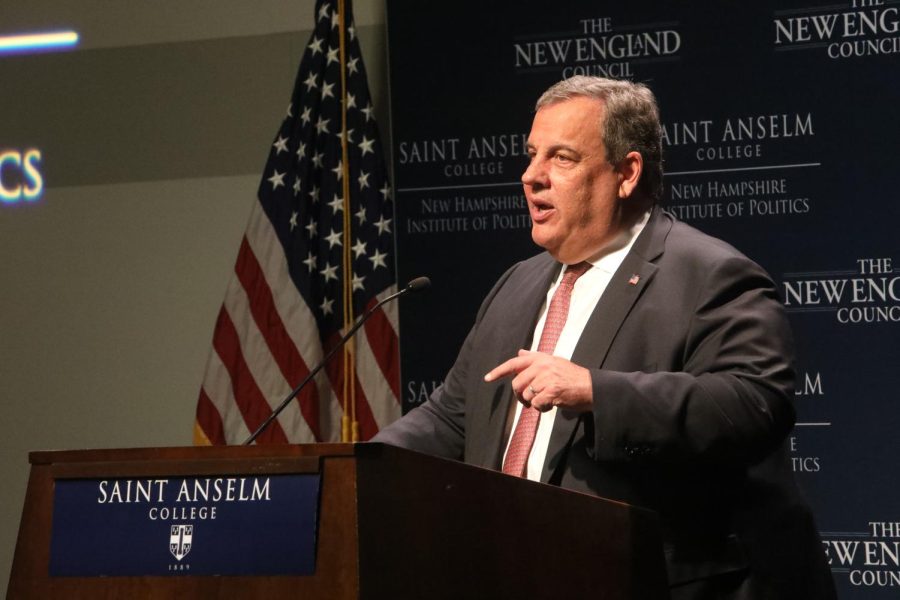A New Jersey classic and GOP hopeful visits Saint Anselm College
Local insight into former Gov. Chris Christie’s leadership reveals an office plagued by scandal
April 2, 2022
Earlier this week, former New Jersey Governor Chris Christie visited the New Hampshire Institute of Politics. Judging from the past few months, it would not be surprising if Christie is exploring a presidential run. While at the institute, Christie gave his critiques of the Biden Administration and how they have hurt the country. Christie has emerged as a classic Republican who opposes the Biden Administration, but does not wish to return to the days of Donald Trump. Christie has most likely forfeited his chance at the Republican nomination by his overt criticism of Trump, but I wish not to discuss his presidential ambitions, but rather the results of his policies as governor of my home state, New Jersey.
Christie served as governor of New Jersey from 2010 until 2018. His administration was a mix of emotions to say the least. Some of Christie’s actions were very beneficial to New Jersey. In 2010, then Governor Christie signed a bill that reduced the cap on property tax growth from 4% to 2%, which gave necessary relief to middle class residents. He also included $2.35 billion in his 2013 fiscal budget for cuts for state businesses. Perhaps even more significantly, he vetoed tax increases in the state five times, including a “millionaires tax,” which would have raised the tax rate from 8.97% to 10.75%. The greatest relief in taxes came for the working class in 2015, when Christie signed legislation expanding earned income tax credit from 20% of the federal credit to 30%. There is no doubt that Christie is fiscally responsible.
Chris Christie was also very strong on taking a stance against teachers’ union corruption. At a time when schools all across America are closed because of the wishes of teachers’ unions, a man like Chris Christie is needed. Shortly after taking office, Christie went on a crusade against teachers’ union excesses and fought against them from his bully pulpit. He specifically questioned people such as Vince Gioradno, the executive director of the New Jersey Education Association (NJEA), who earned $421,000 in salary and more than another $100,000 in benefits. Christie stated, “everybody has a right to make a living, but $550,000 for the executive director of the NJEA? It’s outrageous,” and I strongly agree with his sentiment. Later in his tenure, in 2016, Christie signed several education bills that strongly supported school choice, including one to set state funds aside for private schools that wish to receive security services. Christie always maintained that, throughout his long and impassioned fight against teachers’ unions, his main concern was New Jersey’s children, which is exactly why one would want a man like Christie as their leader.
Christie also showed strong leadership during the aftermath of Hurricane Sandy in 2012, which pummeled New Jersey, especially beachfront communities. Christie was on the front lines, comforting and bringing aid to New Jersey families after the immediate occurrence of the storm. He also communicated very efficiently with the federal government to secure funds for relief and rebuilding. Christie is surely a leader who values people’s personal well-being and as governor, he fought vigorously for his constituents, especially in hard times. As the late British prime minister, Margaret Thatcher once said, “don’t follow the crowd, let the crowd follow you.” Christie certainly heeded those words.
However, Governor Christie’s tenure was not all successful and without problems. Under Christie’s leadership, one of the biggest political scandals in modern history occurred; the Fort Lee lane closure scandal, otherwise known as Bridgegate. Members of Christie’s staff oversaw the intentional closing of lanes at the main toll plaza for the upper level of the George Washington Bridge, which was intended to be political retribution against Fort Lee’s mayor, Mark Sokolich, for his refusal to support Christie’s re-election campaign. The closing caused massive traffic jams and led to back ups and gridlock over the following days. The emergency services were not aware of the closure and declared Fort Lee a threat to public safety. An investigation of the situation over the following years found that members of Christie’s inner circle were directly involved with the plan. Over the course of the 2016 Republican primary, Christie himself was found to have knowledge of the plot, which have since plagued his chance at higher office. Even if Christie did not have knowledge of the plan beforehand, he should have reopened the lanes immediately. Rather, he waited five days before reopening them. Political corruption of this degree should not be tolerated and for this reason, Christie should not run for president or any higher office.
If a politician cannot go without seeking vengeance on another politician for a personal squabble, then they should not be running for office. Politics is a dirty business, but at the end of the day, the people should still be the center of attention, as Christie once professed to believe. If we stand for integrity in our political structure, we must reject Christie and all who favor corruption over cooperation. If we are to preserve the prestigious order of our politics and democracy, we must not be content with electing criminals or even would-be criminals to office. We must not fall prey to the words of the Greek fabulist Aesop when he said, “We hang the petty thieves and appoint the great ones to public office.”



